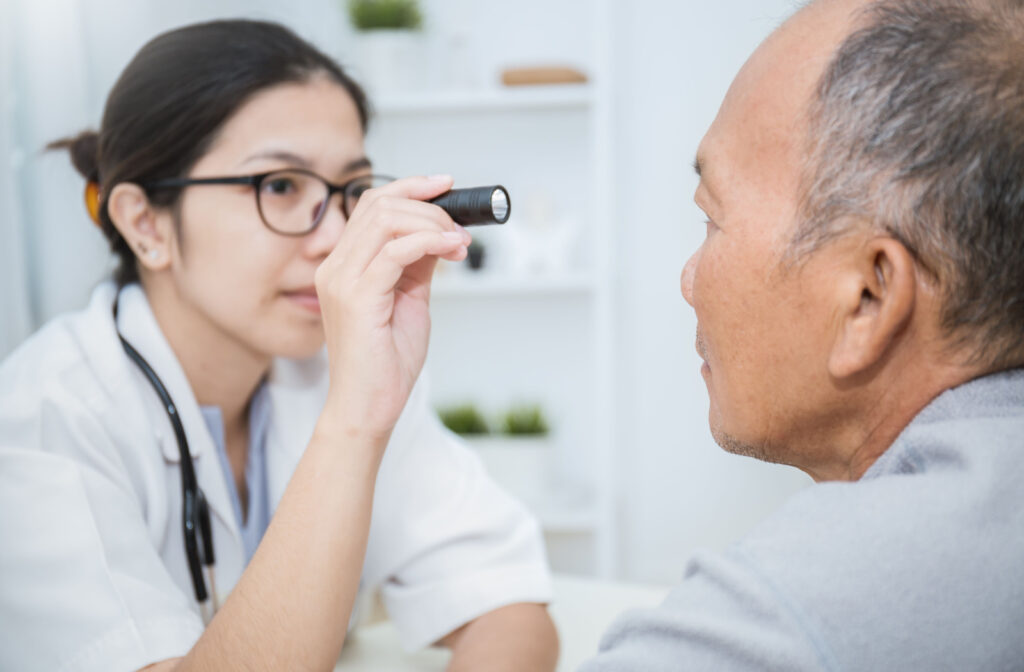Your eyesight tends to naturally deteriorate as you age. One of the most common age-related eye problems is macular degeneration. This condition damages the macula, which is responsible for your central vision. If left unchecked, macular degeneration can result in a loss of sight. However, there are steps you can take to prevent macular degeneration.
Eating a healthy diet, avoiding tobacco, protecting your eyes from ultraviolet (UV) rays, managing your health, and getting regular eye exams can help prevent macular degeneration.
Annual eye exams can help your optometrist monitor your macula, retina, and other ocular structures to detect early stages of macular degeneration, facilitating prompt intervention.
What Is Macular Degeneration?
Age-related macular degeneration (AMD) is a common condition that affects over 10 million people in the United States and is the leading cause of vision loss among those aged 55 and above. It is a progressive eye disease that can result in central vision loss, making everyday tasks like reading and driving difficult.
The macula transmits the light that hits the photoreceptors in your eyes to your brain to create an image. These photoreceptors are critical in helping you see fine details immediately in front of you, such as facial features or words on a page. When these photoreceptors deteriorate, the central vision loses details, while your peripheral or side vision remains unaffected.
Risk Factors of Macular Degeneration
Multiple factors contribute to the development of macular degeneration. The most significant factor is aging—the older you are, the higher your risk of developing AMD.
Additional risk factors can include:
- Genetics
- Smoking
- Exposure to UV light
- High blood pressure
- A diet high in saturated fats
Types of Macular Degeneration
There are 2 types of macular degeneration—dry and wet.
- Dry macular degeneration: the most common type and occurs when the macula gradually thins and deteriorates over time
- Wet macular degeneration: less common but severe and happens when abnormal blood vessels leak blood or fluid into the macula, leading to scarring and vision loss
Symptoms of Macular Degeneration
The early stages of macular degeneration often do not produce any noticeable symptoms. As the condition progresses, individuals may experience:
- Blurry or distorted vision
- Difficulty seeing in dim light
- Blank spots in the visual field
- Dulled color vision
- Wavy or distorted lines
If you experience any of these symptoms, it is essential to schedule an appointment with your optometrist.
How to Prevent Macular Degeneration?
While some risk factors, such as age and family history, are out of your control, lifestyle choices can help alleviate other contributing elements.
Eat a Healthy Diet
Eating a diet high in vegetables and fruits is a great way to protect your eyesight. Research has shown that people with or trying to prevent AMD can benefit from a diet of:
- Dark, leafy greens containing antioxidants such as lutein, zeaxanthin, and vitamins A, C, and E
- Fish and nuts rich in omega-3
- Mediterranean-style foods, such as fruits, legumes, whole grains, limited meats, dairy, and processed foods
- Supplements of beta-carotene, zinc, and copper
Talk to your optometrist before trying any diets or supplements to assess the benefits and risks to your overall health and factor in other medical problems.
Quit Smoking
Smoking has numerous harmful effects on your health, including your vision. Smoking is a major risk factor for AMD, and smokers are twice as likely to develop AMD.
The ingredients in cigarettes can damage the blood vessels in the eye, leading to a loss of vision over time. Quitting smoking and not starting smoking is a great way to protect your eye health, reduce your risk of macular degeneration, and prevent other smoking-related health problems.
Protect Your Eyes from UV Rays
Exposure to the sun’s harmful ultraviolet (UV) rays can damage your eyes. Overexposure to UV light can increase the risk of cataracts and AMD. Sustained unprotected UV light exposure can lead to photokeratitis, similar to a sunburn on the eyes.
It can affect many ocular structures, including the cornea, the conjunctiva, and the eyelids. To protect your eyes, wear sunglasses that provide 100% UV-blocking power when you’re outside, in all weather conditions, during every season.
Take Care of Your Overall Health
Your overall health can have a significant impact on your eye health. Conditions like diabetes, high blood pressure, and weight problems can increase your risk of macular degeneration. Taking care of your general health can also reduce your risk of eye problems.
This includes maintaining a healthy weight, exercising regularly, and checking your blood pressure and blood sugar levels.

Get Regular Eye Exams
Eye exams are essential for supporting your eye health. During an eye exam, your optometrist can identify signs of AMD and other eye conditions. Detecting eye problems early can increase the effectiveness of treatment and reduce the risk of vision loss.
It is recommended that older adults get a comprehensive eye exam annually, even if they believe their eye health and vision are unchanged.
Prioritize Your Eye Health
Many eye conditions, including macular degeneration, don’t have early symptoms. Regular eye exams are often the only way to identify the signs before they advance and damage your vision.
Whether you’re experiencing symptoms or are due for your annual eye exam, schedule a visit to Charles Korth Optometry to preserve healthy vision.




